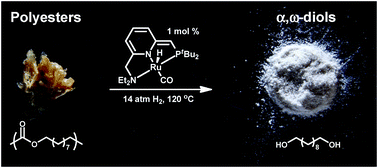Controlled hydrogenative depolymerization of polyesters and polycarbonates catalyzed by ruthenium(ii) PNN pincer complexes†
Abstract
Ruthenium(II) PNN complexes depolymerize many polyesters into diols and polycarbonates into glycols plus methanol via hydrogenation. Notably, polyesters with two methylene units between ester linkages depolymerize to carboxylic acids rather than diols. This methodology represents a new approach for producing useful chemicals from waste plastics.


 Please wait while we load your content...
Please wait while we load your content...